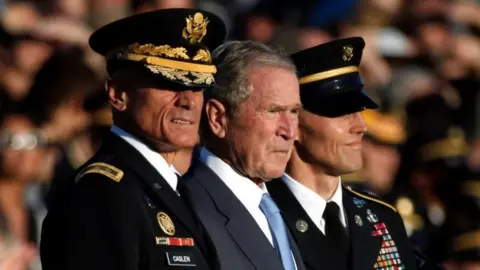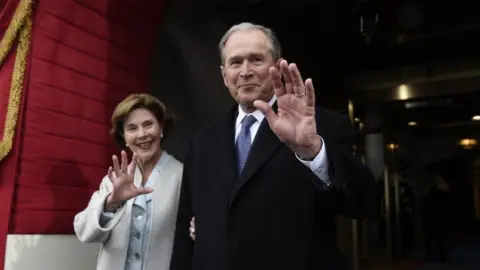Decoding Bush’s thinly veiled Trump speech
Nowhere in George W Bush's 2,000-word speech does he mention the name Donald Trump. It was crystal clear, however, that the 43rd US president took dead aim on the 45th president from a podium at the Lincoln Center in New York City on Thursday.
Ex-presidents traditionally shy away from the political stage. It was long considered in poor taste for a former occupant of the Oval Office to criticise one of his successors.
Then again, these are days when seemingly set-in-stone norms and standards of behaviour have fallen by the wayside.
Mr Trump's victory in the Republican presidential primaries was in some measure a repudiation of Mr Bush's presidency and his vision for the Republican Party - and not just because the New Yorker belittled and subsequently bested Mr Bush's brother, Jeb Bush.
Mr Trump frequently criticised Mr Bush's decision to invade Iraq. He bashed the Texan's efforts to broaden the Republican Party's appeal to Hispanic voters by pushing for comprehensive immigration reform. He denounced free trade deals, including Nafta - signed by Mr Bush's father, George HW Bush.
Now Mr Bush is offering his rebuke. When asked after his speech if his message would reach the White House, he smiled and replied, "I think it will".
Here are just a few of the choicest lines that might be flying toward 1600 Pennsylvania Avenue - and what they could mean.

"Since World War II, America has encouraged and benefited from the global advance of free markets, from the strength of democratic alliances, and from the advance of free societies."
Mr Bush offers the classic defence of an internationalist foreign policy - that engagement and advancement of free markets and free societies is in the US's best long-term interests.
Compare that to Mr Trump's contention that the US has been taken advantage of by other nations - both through trade and in defence arrangements. He has expressed general distrust of multilateral engagement and views the global arena as a largely a zero-sum contest between competing national interests, where the US must put "America first".

"Our politics seems more vulnerable to conspiracy theories and outright fabrication."
Mr Trump rose to national prominence by becoming a high-profile advocate of a particularly insidious conspiracy theory - that Barack Obama was not born in the US and, consequently, was ineligible to be president.
 Reuters
ReutersRepublican Senator Bob Corker, just last week, accused the president of lying on Twitter.
"I don't know why the president tweets out things that are not true," he said. "You know he does it, everyone knows he does it, but he does."
Mr Bush's line was another shot across Mr Trump's bow.

"We've seen nationalism distorted into nativism - forgotten the dynamism that immigration has always brought to America."
Mr Trump not only has pushed for a crackdown on undocumented immigration, he's proposed drastic cuts in refugee resettlement programmes and backed a bill in Congress that would cut in half the number of permanent residency "green cards" issued each year.
"This legislation demonstrates our compassion for struggling American families who deserve an immigration system that puts their needs first and that puts America first," Mr Trump said in August.
Mr Bush looks at the benefits of immigration; Mr Trump focuses on the costs.

"According to our intelligence services, the Russian government has made a project of turning Americans against each other."
Mr Trump, and his supporters, have consistently expressed scepticism about the conclusion by US government officials that Russian agents and hackers attempted to influence the US presidential election through social media, fake new reports and the release of purloined material from Democratic Party sources.
Mr Bush, here, casts his lot with those who have concluded that the Russian threat is real.
 Getty Images
Getty Images
"Our identity as a nation - unlike many other nations - is not determined by geography or ethnicity, by soil or blood... Bigotry or white supremacy in any form is blasphemy against the American creed."
"Blood and soil" was one of the phrases white supremacists chanted as they demonstrated in Charlottesville, Virginia, the night before violent clashes with counter-protesters in August. (Another was "Jews will not replace us").
It was this evening rally that Mr Trump called a "very quiet protest", while apportioning blame for violence to both the supremacists and those who gathered to denounce them.
Mr Trump was roundly criticised, by Democrats and many Republicans - including Mr Bush and his father - for not immediately condemning the Nazi sentiments expressed that weekend.

"Bullying and prejudice in our public life sets a national tone, provides permission for cruelty and bigotry, and compromises the moral education of children."
During the primary campaign, Mr Trump called Jeb Bush a hypocrite, weak, low-energy, a lightweight, a failure, a "sad sack" and a "pathetic figure" with "zero communications skills".
He tweeted that Jeb had to ask his "mommy to take a slap at me" but that "mom can't help you with ISIS, the Chinese or Putin".
He alleged that the former Florida governor had a "soft spot for people from Mexico" because his wife, Columba, is a Mexican immigrant.
It doesn't take a whole lot of reading between the lines on this one.
